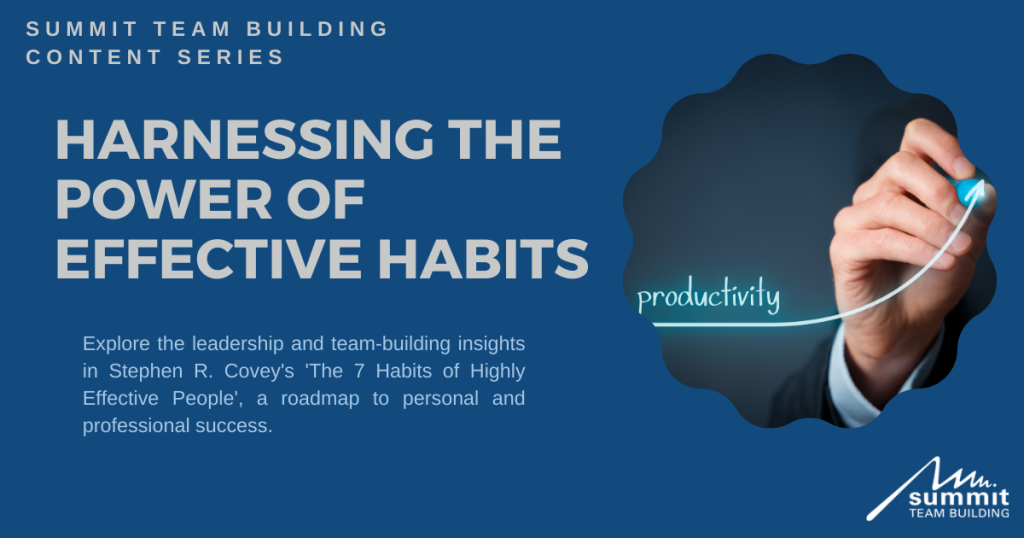
Insights from Stephen R. Covey’s Masterpiece
In a world where success and productivity are highly prized, the quest for personal and professional effectiveness is more relevant than ever. Stephen R. Covey’s seminal work, “The 7 Habits of Highly Effective People®,” stands as a beacon of insight in this pursuit. The book, having sold over 25 million copies, resonates with a simple yet profound truth: effectiveness is a product of both character and competence.
The Seven Effective Habits: A Framework for Success
Stephen R. Covey’s seven habits offer vital insights for improving team dynamics and individual professional development in the workplace:
- Be Proactive: Encourages individual initiative and responsibility.
- Begin with the End in Mind: Focuses on setting clear team goals and visions.
- Put First Things First: Emphasizes effective prioritization and time management.
- Think Win-Win: Aims for mutually beneficial relationships and outcomes.
- Seek First to Understand, Then to Be Understood: Highlights the importance of empathetic communication.
- Synergize: Promotes creative collaboration and leveraging diverse strengths.
- Sharpen the Saw: Stresses the need for personal and professional balance and continual growth.
Each habit offers a pathway to improved team cohesion, efficiency, and effectiveness. The following sections will outline practical implementation strategies and real-world examples relevant to a professional setting.
| Habit | How to Learn | Example |
|---|---|---|
| 1) Be Proactive: Take charge of your life by focusing on things within your control. | Start by taking responsibility for your actions. Reflect on your daily decisions and use proactive language. | A manager doesn’t blame external factors for team performance issues; instead, they identify what can be improved within their control, like communication or training. |
| 2) Begin with the End in Mind: Define clear, long-term goals to guide your path. | Develop a personal vision or mission statement and visualize your goals. | An entrepreneur starts a business with a clear vision of its purpose and the impact it aims to have, guiding all strategic decisions. |
| 3) Put First Things First: Prioritize tasks that align with your core values and goals. | Learn to categorize tasks and focus on important ones that align with your values. | A professional prioritizes a crucial project deadline over attending an optional meeting, aligning actions with key goals. |
| 4) Think Win-Win: Embrace a mindset of mutual benefit in your interactions. | Practice empathy and aim for mutually beneficial solutions. | In a negotiation, a businessperson seeks a deal that benefits both parties, building long-term relationships rather than just winning. |
| 5) Seek First to Understand, Then to Be Understood: Practice empathetic listening for effective communication. | Emphasize active listening, focusing on understanding before responding. | A doctor listens attentively to a patient’s concerns before offering medical advice, ensuring accurate understanding and trust. |
| 6) Synergize: Collaborate to create outcomes greater than individual efforts. | Look for collaborative opportunities and appreciate diverse perspectives. | A team with varied skills collaborates on a project, combining their strengths to create a superior product. |
| 7) Sharpen the Saw: Continuously improve and renew yourself in various life aspects. | Invest time in activities that enhance your physical, mental, and emotional well-being. | A busy professional ensures to schedule regular exercise, reading, and family time to maintain balance and effectiveness. |
Beyond the Habits: Deep Dives into Effectiveness
The video summary by Four Minute Books, narrated by Ian Pringle, dives deeper into three key areas of effective habits: the funeral test, learning to say no, and practicing active listening.
- The Funeral Test: This thought exercise, derived from the habit of beginning with the end in mind, urges us to envision our own funeral and consider what we want to be remembered for. This powerful reflection can redefine our priorities and goals.
- Learning to Say No: An essential skill in today’s busy world. Understanding our ultimate goals allows us to discern which opportunities align with our path and which ones to decline.
- Practicing Active Listening: This facet of effective communication is not just about hearing but understanding. By truly listening to others, we build trust and foster deeper connections.
MORE POSTS ABOUT STEVEN COVEY’S WORK: 4 Quadrants and Big Rock Thinking | The Circle of Influence Model
Conclusion: A Timeless Guide to Personal and Professional Effectiveness
Stephen R. Covey’s “The 7 Habits of Highly Effective People®” is more than a book; it’s a guide to living with intention and purpose. By adopting these habits, we move beyond the pursuit of efficiency to embrace true effectiveness. As we integrate these habits into our daily lives, we not only achieve our goals but also contribute to a more collaborative and understanding world.
Remember, as Covey says, “The main thing is to keep the main thing the main thing.” Let’s focus on what truly matters and shape a life of effectiveness and fulfillment.
MAKE YOUR TEAM MORE EFFECTIVE: Learn about our High Performance Teamwork workshop and the Survive or Thrive Team Building Activity
Summit Can Help!
Interested in applying these effective habits principles to your team? Explore Summit’s range of team-building activities and workshops tailored to address the unique challenges faced by teams today. Contact us to get started.

